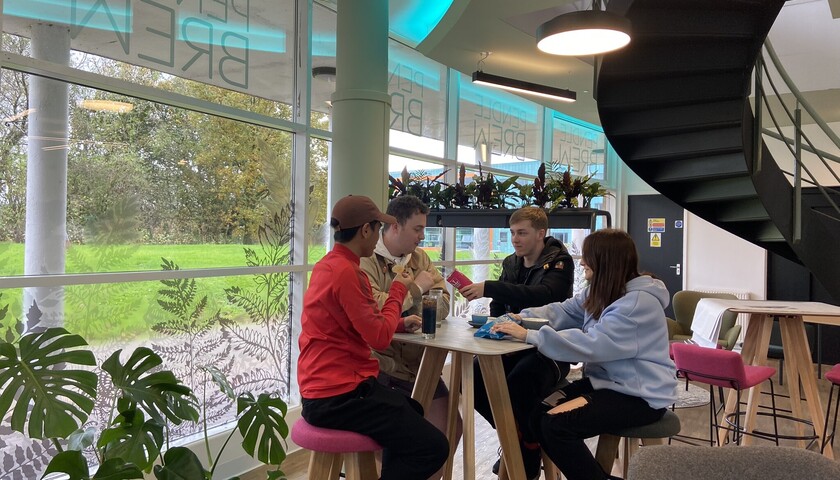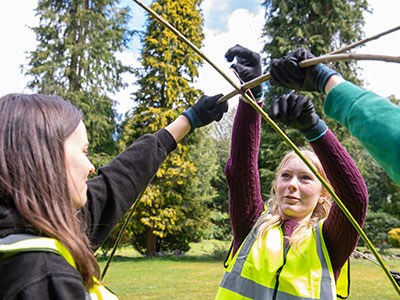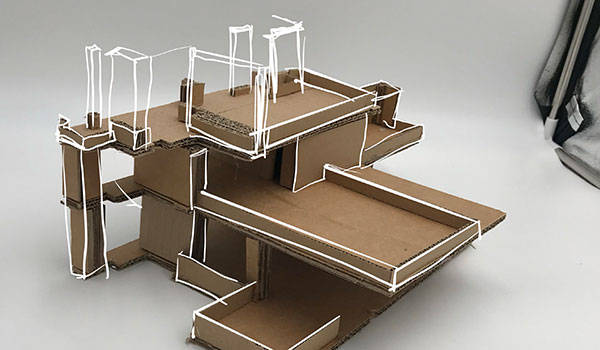Why Lancaster
- Study in a department that guarantees a dedicated studio space for every student, available 24/7
- Take inspiration from our location – a rural, green campus on the edge of industrial cities and the Lake District
- Learn from experts shaping conversation on technology, environment and architecture and delivering TEA Talks
- Benefit from top facilities, from hand tools, 3D printers and laser scanners to CNC routers, large-scale printers and specialist software
- Enhance your CV with live project work, networking events, practice experience, summer school and mentoring
Tackling the climate crisis and protecting the world around us underpins everything we do at Lancaster School of Architecture. Join us to explore the future of architecture through solving real-world issues and develop an unbeatable mix of practical skills.
Radical creativity with a conscience
If you want to gain the know-how to be agile and ethical in your architectural practice, study with us. Here you’ll learn to build with sustainability in mind and design innovative spaces that match the needs of the communities that will use them.
Sustainability is at the heart of all our modules. We empower students to search for innovative solutions that repurpose materials and extend the life cycle of buildings. We’re also one of the first courses in the country to implement the latest ARB and RIBA guidance on teaching ethics, professionalism, fire safety and sustainability.
Hands-on learning
Our campus is an inspirational setting for studying architecture. You’ll experience a great contrast in the Architecture of our working spaces – an Arts and Crafts manor house and the award-winning Lancaster Institute for the Contemporary Arts. Our studio layout allows you to experience the culture of a professional practice and work collaboratively with other students.
Alongside lectures, seminars and practical workshops you will have one-to-one tutorials and plenty of opportunities for hands-on work in the studio. Our size allows us to get to know all our students well, and you’ll get to know us well too, which makes for a friendly and productive environment.
Summer school is a great chance to work alongside academics and architecture students from other years. This option is an opportunity to develop your teamwork skills, enhance your CV and explore innovative design approaches, technical solutions and materials. Weather permitting, much of this is outdoors.
Your Placement Year
Sometimes known as a year in industry, your placement year will take place between your second and final year of study and this will extend your degree to four years.
A placement year is an excellent way to...
- try out a role that you may be interested in as a career path
- start to build your professional network (some placement students are offered permanent roles to return to after they graduate)
- develop skills, knowledge and experience to put you ahead of the field when you graduate
You'll spend your third year...
in a paid, graduate-level position, where you’ll work for between nine and twelve months in the type of role that you might be considering for after you graduate. A very wide range of companies and organisations offer placements across all sectors.
As a full-time employee, you’ll have a detailed job description with specific responsibilities and opportunities to access training and development, the same as other employees.
Our Careers and Placements Team…
will help you to secure a suitable placement with expert advice and resources, such as creating an effective CV, and tips for applications and interviews.
You will still be a Lancaster University student during your placement and we’ll keep in touch to check how you are getting on.
The university will...
use all reasonable effort to support you to find a suitable placement for your studies. While a placement role may not be available in a field or organisation that is directly related to your academic studies or career aspirations, all offer valuable experience of working at a graduate level and gaining a range of professional skills.
If you are unsuccessful in securing a suitable placement for your third year, you will be able to transfer to the equivalent non-placement degree scheme and continue with your studies at Lancaster, finishing your degree after your third year.















